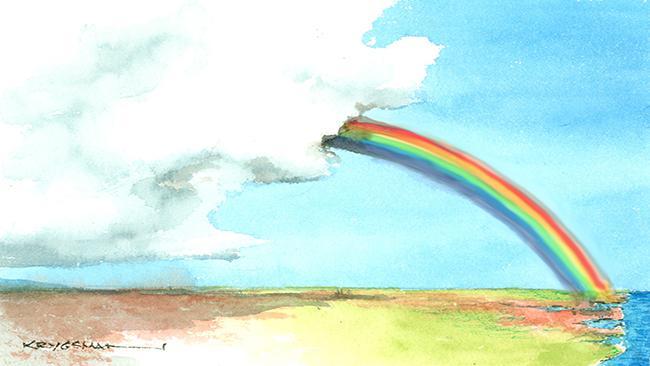
LABOR'S road to recovery rested with a new demographic known as the mummy bloggers, Julia Gillard reportedly told caucus 14 months ago before delivering a one-hour PowerPoint presentation on the effectiveness of social media.
Whatever Labor's fate on September 7, we will never know how much worse it might have been if Gillard had not reached out to the women who tweet, inviting them for tea at Kirribilli House and then to the Rooty Hill RSL for a private dinner in March.
"It is probably impossible to overestimate the admiration and affection for Gillard among women," wrote Anne Summers in The Age. It would be interesting to know if Summers now agrees the chardonnay-mums strategy failed, and that Gillard looked foolish breezing past the RSL cafe without stopping to talk to the locals. The incident, shot on broadcaster Paul Murray's camera phone, symbolised the gulf between Labor and its traditional voters, who are now barely on speaking terms.
Ed Husic looks like he will hold on to the seat of Chifley, which includes Rooty Hill, but Labor is likely to have to beg preferences for the first time since the seat was created in 1969. For those who still think of Labor as the party of dispossessed, the champion of underprivileged kids in undernourished postcodes, this political reversal requires an explanation. For the battlers to vote against the party of redistribution would seem to be, as Thomas Frank wrote in What's the Matter with Kansas?, a derangement in the bedrock of civic order.
The redistribution message has little appeal in Rooty Hill, however. The last Labor leader who sought a mandate to deliver "freedom from want" was Ben Chifley in 1949. One can only imagine what Chifley might think today, wandering past the Mercs and Audis in the Rooty Hill RSL car park, for the first thing to note about the people of western Sydney is that they are not poor.
Aggregating 14 federal constituencies in the western suburbs of Sydney as a measure, 46 per cent of households had annual incomes of $78,000 or less, pretty much the same as in the rest of the country. At the other end, those on $150,000 or more were higher - 9.3 per cent compared with 8.5 per cent. Westies have larger mortgages, have more cars, and enjoy higher internet penetration than the rest of country.
Westies pay their own way in life. Private-sector employees outnumber public servants by almost seven to one; nationally it is six to one. Fewer people are on an age pension (12.5 per cent compared with 14.3 per cent nationally), disability support (4.7 per cent with 5.2 per cent) or Newstart (4.4 per cent with 8.5 per cent).
Westies are not just a little bit socially conservative, but a lot. In the western suburbs, there is one de-facto relationship for every 10 registered marriages. In the rest of the country it is one to every five.
Less than 13 per cent of Westies disavow religion; in the rest of the country 23 per cent do so. At the 2010 election, the Greens' primary vote was 8.1 per cent across the 14 seats; in the rest of the country it was 12.2 per cent.
Non-Western migrants are the cultural backbone of working-class social conservatives. The progressive narrative paints them as victims, as a friendless, non-white underclass battling discrimination at every turn, reliant on the handouts and tribunal judgments only the compassionate Left provides.
The rights-based individualism of the Western world, however, sits awkwardly with most non-Western cultures, particularly in Asia, where loyalty and respect for family and tradition are paramount. The family unit, not the benevolent state, remains the dominant community support mechanism and the thread that binds the social fabric.
In western Sydney, a third of residents speak an Asian language at home; in the rest of the country it is less than a tenth.
Non-Western migrants are predominantly social conservatives, a point of difference to which the progressives remain culturally insensitive.
A cross-cultural study by Richard Shweder at Chicago University in 1987 showed that Indians and Americans agreed that kicking a sleeping dog was wrong, but beyond that, notions of virtue diverged. Americans thought it was OK for a 25-year-old son to address his father by his first name, but the Indians had a problem with it. The Indians thought it was OK for a husband to punish his wife if she went to the cinema without permission, while the Americans did not.
Shweder found these were more than differences of opinion, they touched on matters that cultural traditions determined but which individuals thought were universally and irredeemably wrong.
The Indians' socio-centric rules of etiquette, with their strong attachment to authority and hierarchy within the family, carried the same moral force, in other words, as the cause of same-sex marriage does for most Western progressives. Yet same-sex marriage is a difficult concept for many non-Westerners to get their heads around, not least in western Sydney, where nine out of 10 Labor MPs opposed a bill on the subject last year.
On Sunday's Insiders on ABC TV, the panellists bemoaned the fact that a just cause, as they see it, could be vetoed by a block vote in western Sydney. Some might argue that they have overestimated the enthusiasm for altering the Marriage Act elsewhere in the country. The lesson remains. Cultural sensitivity cuts both ways.


